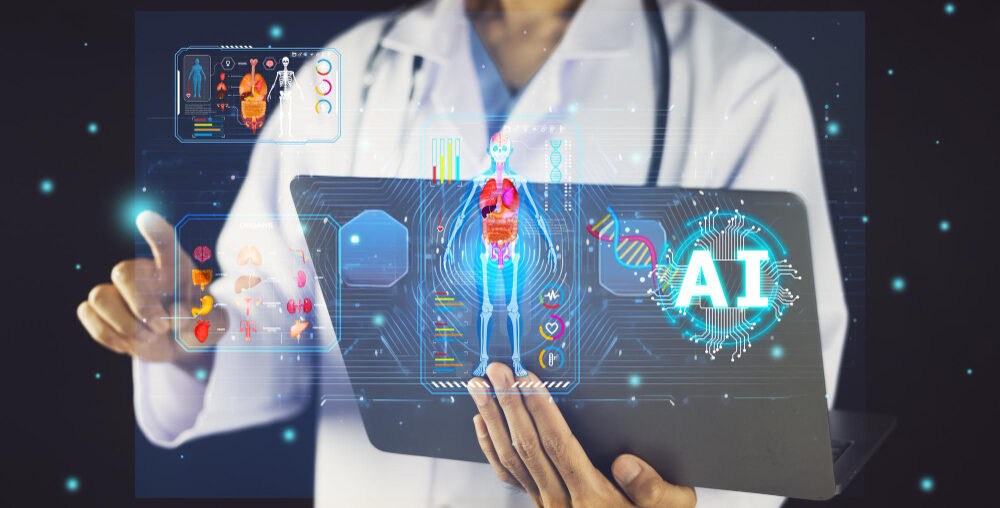Artificial Intelligence (AI) is transforming healthcare in remarkable ways. One of the most impactful changes is in disease diagnosis and early detection. By analyzing data faster and more accurately than traditional methods, AI is helping doctors identify illnesses earlier, improving treatment outcomes, and even saving lives.
Let’s explore how AI is reshaping disease diagnosis and early detection in 2025.
1. Faster and More Accurate Diagnosis
AI systems can process vast amounts of medical data quickly. This allows healthcare providers to diagnose conditions with greater speed and accuracy.
How AI Helps:
- Analyzes medical images like X-rays, CT scans, and MRIs faster than humans.
- Detects subtle patterns that may be missed by doctors.
- Reduces human errors, improving diagnostic precision.
Example:
- AI algorithms have shown impressive results in detecting lung cancer, breast cancer, and brain tumors with high accuracy.
See also: How to Attract More Patients in 2025 with Smart Lead Generation Tactics
2. Early Detection of Life-Threatening Conditions
Early diagnosis often makes a huge difference in treatment success. AI-powered tools excel at identifying warning signs that traditional methods may overlook.
How AI Helps:
- Identifies early symptoms of diseases like diabetes, heart disease, and Alzheimer’s.
- Uses predictive analytics to spot patterns in patient data that suggest potential health risks.
- Alerts healthcare providers to take action before conditions worsen.
Example:
- Heart disease prediction models powered by AI can detect warning signs years before symptoms appear.
3. AI in Medical Imaging
Medical imaging has significantly improved with AI integration. AI models trained on thousands of images can highlight abnormalities with exceptional accuracy.
Key Benefits:
- Enhances image clarity and sharpness.
- Identifies tumors, fractures, or internal injuries faster.
- Reduces the need for invasive diagnostic procedures.
Example:
- PathAI specializes in AI-driven pathology for detecting cancer cells efficiently.
4. Personalized Risk Assessment
AI leverages patient data to assess individual health risks, allowing doctors to create customized prevention plans.
How AI Helps:
- Uses genetic information, lifestyle habits, and medical history to predict potential risks.
- Identifies high-risk patients and enables early intervention.
- Encourages preventive care to reduce hospital visits.
Example:
- K Health provides personalized health predictions based on user data.
5. AI in Wearable Devices
Smartwatches, fitness trackers, and health monitors now utilize AI to track real-time health data.
How AI Helps:
- Monitors heart rate, oxygen levels, and sleep patterns.
- Detects abnormal readings that may signal potential health issues.
- Notifies users or healthcare providers in emergencies.
Example:
- Apple Watch and Fitbit use AI to identify irregular heart rhythms like atrial fibrillation.
See also: Improve Lead Quality with AI: Best Tools and Strategies for Success
6. AI in Mental Health Diagnosis
AI is playing a growing role in identifying mental health conditions like depression, anxiety, and PTSD.
How AI Helps:
- Analyzes speech patterns, social media behavior, and biometric data.
- Identifies emotional changes and unusual patterns in communication.
- Provides mental health professionals with valuable insights for better care.
Example:
- Wysa is an AI-driven mental health chatbot offering emotional support and therapy guidance.
7. Drug Discovery and Research
AI speeds up the development of new treatments by analyzing complex data.
How AI Helps:
- Identifies potential drug candidates faster.
- Predicts how certain drugs will react in the human body.
- Helps researchers understand disease behavior better.
Example:
- BenevolentAI uses AI to identify new drug treatments for challenging diseases.
8. AI for Remote Healthcare Solutions
Telemedicine combined with AI makes healthcare accessible to more people, especially in remote areas.
How AI Helps:
- Diagnoses common illnesses through chatbots and virtual assistants.
- Guides patients on treatment options or when to seek urgent care.
- Reduces pressure on healthcare systems by managing minor cases remotely.
Example:
- Ada Health uses AI to analyze symptoms and recommend the best action steps.
9. Improved Patient Management Systems
AI streamlines healthcare operations by organizing patient data efficiently.
How AI Helps:
- Tracks patient records, test results, and treatment history.
- Provides doctors with real-time updates for better decision-making.
- Reduces administrative errors and improves data security.
Example:
- Epic Systems integrates AI to manage electronic health records (EHR).
See also: Unlock Business Growth: Key Benefits of AI for Smarter Operations
10. Predictive Healthcare Models for Future Trends
AI can predict disease outbreaks, seasonal flu trends, and public health risks by analyzing vast data sources.
How AI Helps:
- Identifies patterns in global health data to predict outbreaks.
- Guides healthcare providers to prepare in advance.
- Helps governments design better public health strategies.
Example:
- BlueDot accurately predicted the COVID-19 outbreak by analyzing global data.
Conclusion
AI is revolutionizing disease diagnosis and early detection by improving accuracy, accelerating processes, and offering personalized care. From identifying cancer cells to monitoring heart conditions via wearables, AI’s impact is transforming healthcare for the better.




